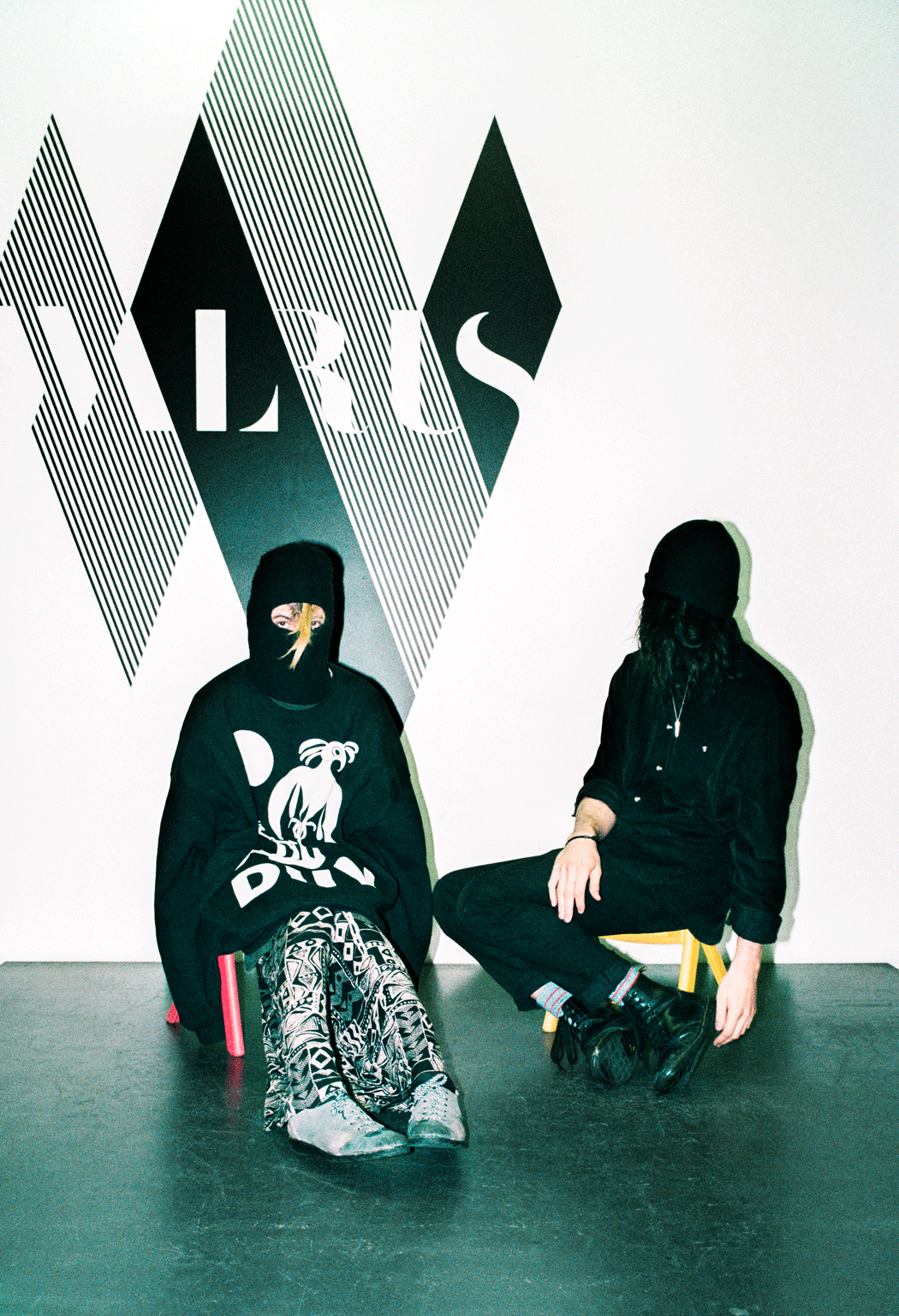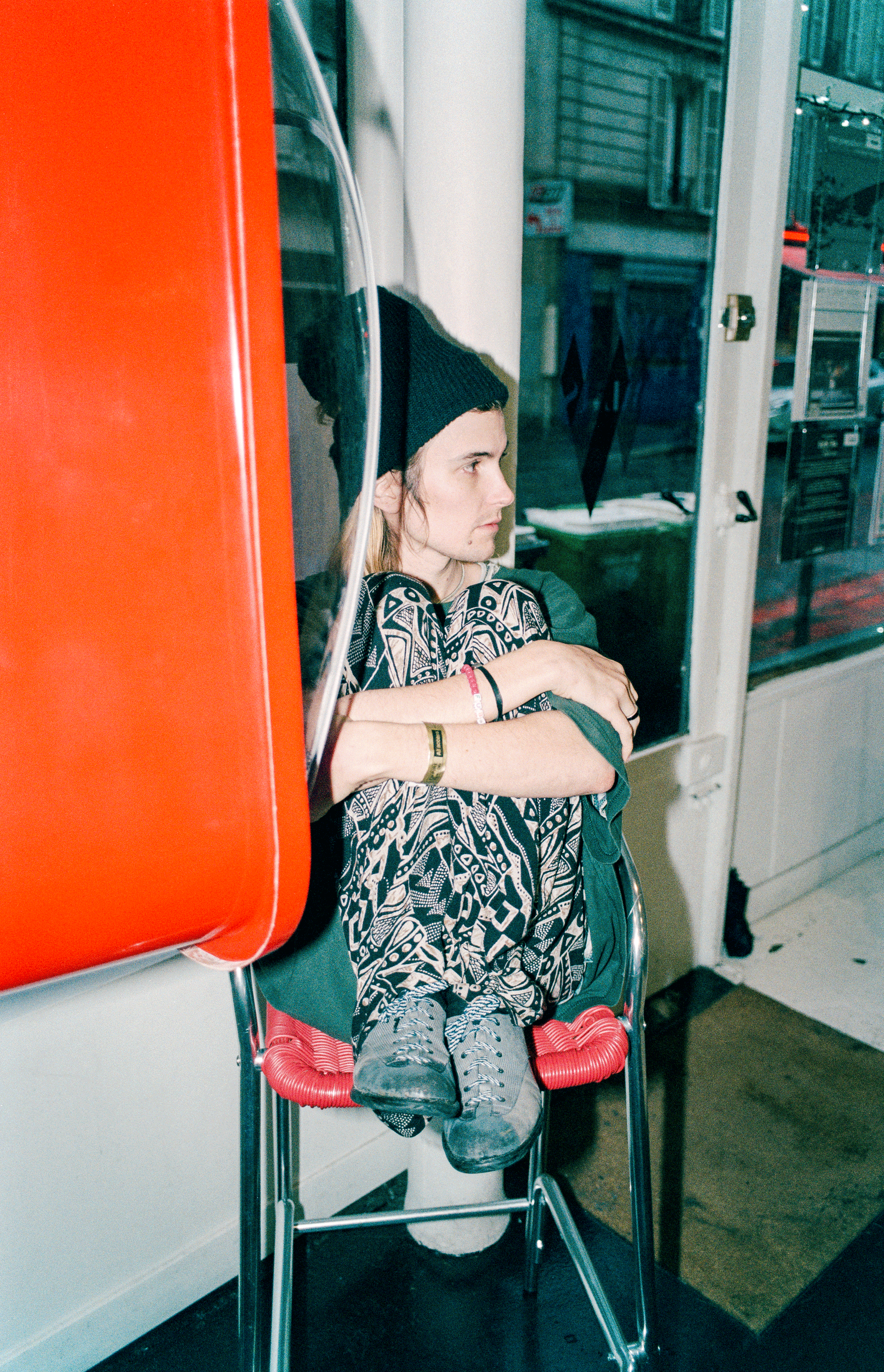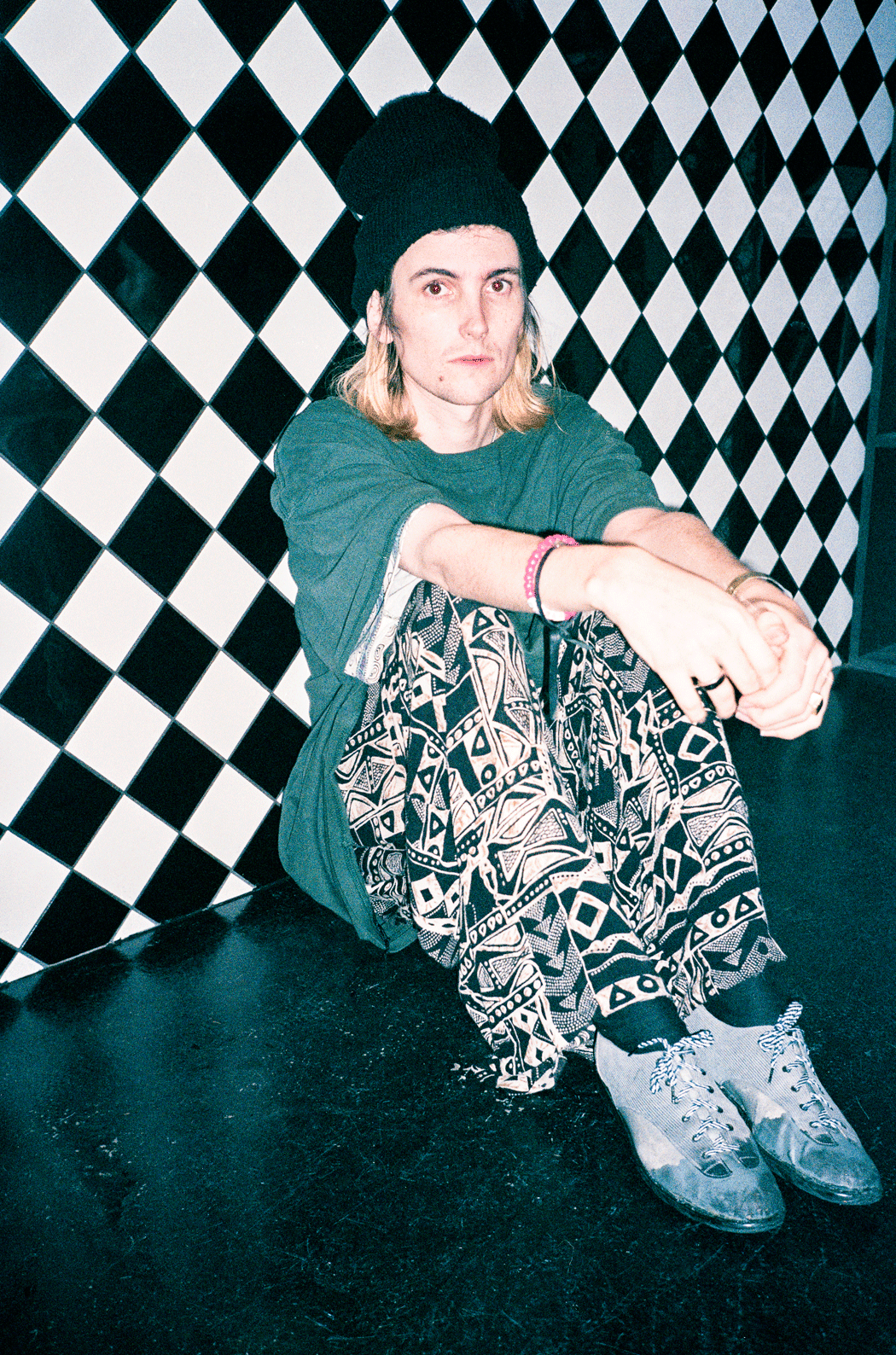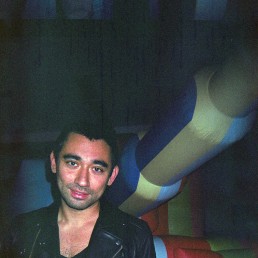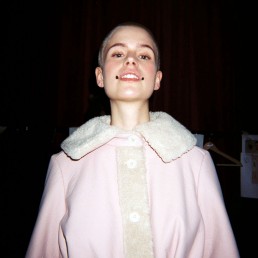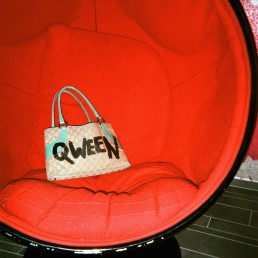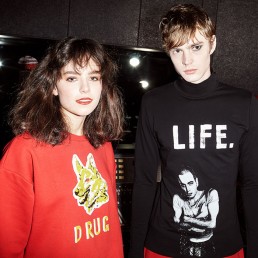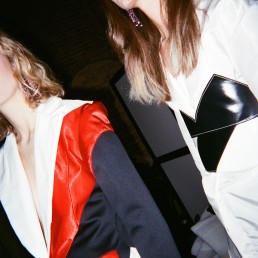On a rainy afternoon in Paris, we met up with Zachary Cole Smith and Colin Caulfield from DIIV at the Walrus record store. DIIV’s album Is the Is Are out last year was one of the most anticipated of 2016. After looking at all the fascinating and peculiar vinyls and even finding Oshin and Beach Fossils in the mix, we asked the boys about their new album, Brooklyn, Hedi Slimane and their music hiatus. Fans, followers and the music industry have been waiting for a while now but we can positively say that they once again successfully delivered music for the flawed yet resilient DIIV tribe. Just as Molière once said, “Trees that are slow to grow bear the best fruit.”
What can you tell us about your long-awaited new album Is the Is Are?
Zachary Cole: It’s definitely a DIIV record but if people are expecting us to do our first record again that’s not what it is. It’s very different but after hearing every single song for five seconds, you can know it’s us. It sounds like us and I feel like we carved out more of a distinct signature sound than we did on the first one. The subject matter is more serious and much more intense. It’s a very exposed, raw and naked album, and musically it’s kind of all over the place and has a lot of diversity.
What’s the meaning behind the title?
ZC: I wanted something that felt profound and at the same time a maxim that felt also meaningless. I had a French poet/artist who I gave directions to, I wrote five sample poems and told him, “I want you to write 50 poems like this,” and he did. I picked about 20 that I liked and that I wanted to include with the album. There are four that I included in the album art and then used one for the title. It’s the last line of a poem and when you open the album, the four poems are on the first vinyl so you can see its context. I wanted something that felt almost silly, something that could be mocked, and something very human, flawed. The record is about my own flaws and I also wanted to communicate the feeling of being misunderstood and alienated which is another big theme. No matter whom you are, when you read the album title you probably assume that you’re misunderstanding the intentions but it’s meant to be like disorienting.
What changed since Oshin? I know some of the original members are no longer with you and some personal adventures or misadventures have struck the band.
ZC: Our drummer’s changed but actually our new drummer was also on the first record too so there’s not really much difference. I don’t feel like I’m the same person that I was then. The first album was innocent and wide eyed, wanting to break into the music world, and this record came from a period of hard living through lots of intense things. In some ways, it was the best period of my life and in other ways, by far the worst. Up and down, all over the place, love and heartbreak, sickness and just disaster.
Would you say overcoming that pushed DIIV to create a new album?
ZC: Going through something and afterwards thinking, “What the fuck just happened?” is like trying to work through your own thoughts. In a lot of ways, the record meant to be redemptive and after everything that happened I was worried that people weren’t going to take us seriously as a band. There’s just so much talk about but so little that has to do with the music, so I was worried that everything was going to fall by the wayside.
The first album did well and the feeling of success and knowing that people like your music feels amazing, but when people start talking about you because you’re a fucking punch line, that doesn’t feel good. I wanted to go back to how things used to be, but I knew that the only way to do that was to make something much better than last time. If we made the same record again, it would prove everybody right and show everybody that, “Yeah they’re just a one trick pony, they made one record and it was a phenomenon of its own, but they can’t do it again.” I didn’t think I could do it again, I had no faith in myself or my own abilities but I just worked really hard at it. I put nothing else in my mind for three years and I hope it will surpass people’s expectations and any reservations people might have about us. I hope that by the time they hear the music, they’ll change their minds.
So we could say you came to terms with yourself by showing people that you are more than these labels you’re surrounded with.
ZC: I had to get past all of the negative shit from my past. Being defined by your past is one of the hardest things to deal with because you can’t change it no matter what, but you can do your best to come to terms with it and help others come to terms with it. All I want to convey with this record is that I’m a human and flawed, deeply flawed, like everybody. I hope that through hearing the record they can hear my own humanity and hopefully empathize and be less judgmental or harsh. I never finished or completed anything in my life, I’d start things but never finish them, but here I finished a record. I did it, I made it and if I can do it, you can do it. If I can overcome all this shit you can overcome your thing too.
I’ve read that you worked in several places, like a restaurant where you met some musicians. When did music become a priority to you?
ZC: I was doing odd jobs here and there and then I moved to New York. I met this girl on New Year’s Eve and went home with her and it turned out she was moving the next day and I decided to help her with my car. I helped her move in and get all the furniture for free and it felt like our house, so I stayed there for about six months. After a while I thought I should probably get a job so I started selling weed in New York and then I got a bit stir crazy with the relationship. It wasn’t a real relationship we were like roommates that shared a bed, so I said “Fuck this” and I left. I spent six months living in my car driving around the country, travelling, visiting friends, doing random stuff with the money I saved up from selling weed. I drove out to California to get weed and bring it back but I ended up taking 6 months. I got back, sold the weed and after a while I applied for a job at a restaurant. I walked to the front and asked, “Hey are you guys hiring?” The guy was like, “No, but do you play bass?” So I started playing in his band and with everyone that had a band in the restaurant I played in. At the end I was playing in four bands and then started playing in Beach Fossils. I toured with two bands from the restaurant and Beach Fossils for a couple of years. Then I thought, “I can do this myself, I can definitely start a band.” I just realized it was something that could be done, it was never a goal of mine but I just saw an opening in New York.
Speaking about New York, what do you think of the changes in Brooklyn? Is it really that gentrified as people make it seem?
ZC: Yeah, it depends obviously where you’re at, but the fact that me and Sky got forced out of our apartment by the price rise (Sky does pretty ok) was just like, “God this shit is out of control.” My sister and her boyfriend are both accountants, they do well and they moved directly across the street from me and Sky’s old apartment. They are the type of people who are moving in, young urban professional couples who are probably either about to have kids or already have kids.
So they want “proper families” or “stable families” to move in?
ZC: The infrastructure of the neighbourhood can’t handle it. The trains are bloated, they can’t handle this many people. When you build a high-rise and the piece of land is big, the area can’t handle that influx so I don’t think it’s good but there are also other neighbourhoods who are getting gentrified and maintaining a level of cool where you can feel that some things will never change, like Bushwick. It’s funny when you think what made Williamsburg cool; all the underground music and the cool shit that was there so all the influx people went there because it’s cool. Because of that, they end up pricing out all the venues and the cool stuff that made the neighbourhood in the first place. Now all of these amazing venues like Death by Audio, 285 Kent, Glasslands are literally all gone.
Colin Caulfield: That was, I think, the most notable thing. In New York gentrification has been happening for a while, neighbourhoods are constantly changing but Williamsburg was the epitome of the artist scene in a cool city, it was the scene in New York. Everyone that played music went there, it was what you did, and I wasn’t even living in New York at the time. It was an area dedicated to creative people.
ZC: They had a built-in audience and that’s who we owe our success to. We started playing shows and didn’t have to get out there and put flyers up to get people to come to our shows because the audience was already there. If they hadn’t heard of the band, they were happy because they got to check out something new. There were hundreds of kids who would go to shows every night and party. It was an actual scene, a real community. It wasn’t a scene in the sense of the New York scene or the Kitchen scene in the 70s, where there were musicians making similar music. All the bands sounded completely different. Some were pop, some were electronic, some were making crazy broke guitar “poppy” shit. We’d play with bands that sound like Bow Wow Wow or Madonna so we were all different. It wasn’t a cohesive musical sound but it was a scene in terms of people who would see a show every night and play together even though the music wasn’t the same, it’s a scene that supports itself. A lot of people asked about Brooklyn in the past and I’d say, “Well there’s not really a scene, the bands don’t sound anything like each other,” but I guess I was taking for granted the fact that there was a real community of people who regardless of what the bands sounded like, they were still supporting each other.
A lot of places where you used to play at have closed.
ZC: Yeah everything.
Would say it’s because of gentrification or do you think it’s a part of, let’s say, “natural selection”?
ZC: What those clubs were, the DIY mentality, they were transient by nature, they weren’t made to last. If they wanted to last they would have gotten permits or what they needed. It’s like a slash-and-burn, you build something, let it rise and then one day a cop can bust it down, it’s gone and on to the next thing. It was never about the physical spaces, more about the community and availability of various spaces. There were so many empty warehouses in that area that you could just do a show here or there, and all along the waterfront which is now turning into the most valuable real estate in the entire city. It was empty warehouses and in one street, Death By Audio, 285 Kent, Glasslands, Secret Project Robot they were literally seven blocks in the same stretch of street and if one was closed then you’d just go to the next one and so on. Then the neighbourhood just took gasoline and dumped it down and burnt the whole thing up and now it’s just gone.
CC: It was gone in almost a flash and it’s really recent.
ZC: We played the final show at 285 Kent and it was covered by the New York Times, The New Yorker, these big publications were there and it was like putting the final nail the coffin. It was a really big celebration of the end. 285 Kent ended and a couple of months later, Glasslands ended and we also played the final show there. Then Death by Audio ended in a very spectacular way with a whole month of shows. These were the three biggest venues and they all closed in a month and instead of having new spots to build, it felt very final. It all happened at once and you can’t recover from that. The same people who were in the scene for so long probably started when they were 21 and now they’re around 26 and think, “I can’t run a fucking DIY place for my whole life, I have to get a job.”
CC: I think it’s really discouraging for artists and a community of creative people to see this thing that you felt you could give your life to and felt confident about doing, and now it’s gone.
ZC: There were so many good artists coming out of it too, it seems there hasn’t been a good artist coming out of the underground scene in a while.
They felt at home.
CC: B ecause now people are less willing to commit themselves fully, there isn’t a platform or security.
Let’s talk about Nirvana and music. Which other bands do you admire as a musician yourself? Any new talents that you’d recommend?
ZC: Well, Nirvana is not so much an influence just kind of a touchstone. I feel that early on I wanted to put our music in context. If you listen to our first record, sometimes it’s hard to pick up on the punk energy behind it, so I wanted to cite Nirvana to point out the angst beneath the first record. Kurt Cobain is obviously an idol to a lot of people including myself but I wouldn’t say he is a huge influence on me, it was more that I read his journals and it was like reading a “How to start a band” book. He was writing letters to his drummer, telling him that they had to practice six days a week, planning out the artwork, the songs, everything he did, his lyrics, it’s all in there so when I started the band that was a big touchstone for me. I got the name DIIV from his journals because there is this page where he wrote “dive, dive, dive” and it was pretty cool. As for other bands, a big band and influence on this new album is Sonic Youth and their record Bad Moon Rising. It was another big touchstone, I sent it to our engineer and told him that this was the sound I want to capture and I think that there are some similarities. In terms of new bands, I don’t have the first idea about new bands at all.
CC: Sunflower Bean, they’re a really young band.
ZC: Oh yeah, Sunflower Bean we just toured with them, they came to Paris last week. They are amazing, they’re young, around 21 and they’re really heavy and riffy.
CC: We share a lot of sensibilities with them but we have different reference points. They’re a bit more like Black Sabbath or Led Zeppelin.
ZC: They’re also Saint Laurent models.
How did that opportunity (modelling for Saint Laurent) come along?
ZC: Sky and Hedi had been working for a long time, so I met Hedi and we went out for dinner and a couple of days later I got a call asking if I’d be available to do a campaign but a year in the future. They asked me in June if I was available next March and I said, “I guess so.” I didn’t hear anything about it and then ended up doing the campaign and a couple of shows. I think Hedi is a genius and he really made fashion cool again. I saw Kanye West at Madison Square Garden and he was on this long rant about how Hedi Slimane wouldn’t let him into his fashion show and I feel that it made young kids feel that fashion was cool again. Hedi made a connection between fashion and rock ‘n roll that was lost over the years. He really nailed that connection back into place. Just watching him work is like amazing.
Would you say that Is the Is Are is redemption, a fresh start?
ZC: Yeah, it’s meant to be a redemptive record for sure. Hopefully I’ll move the conversation back to music and not about other bullshit.
